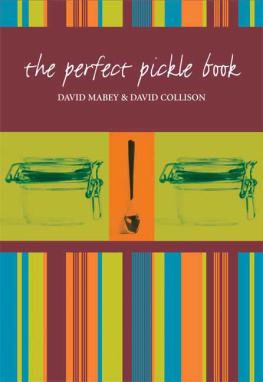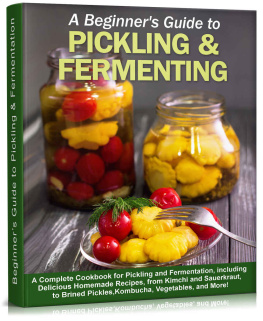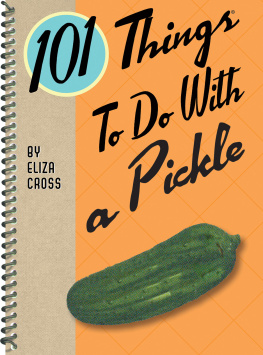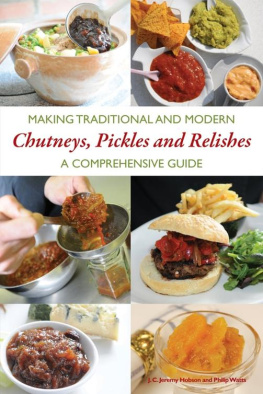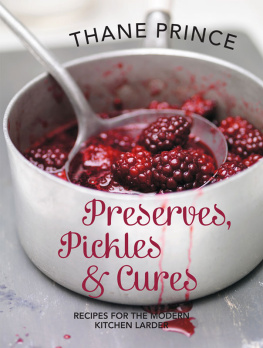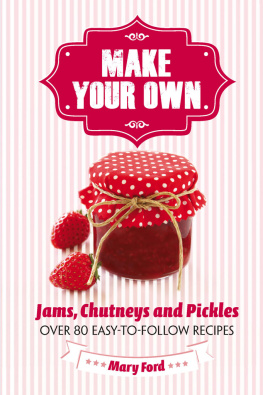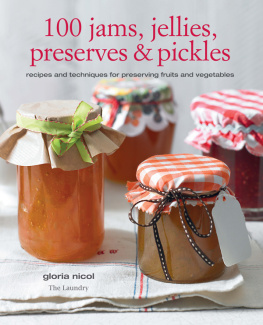This book started life in 1988 as an accompaniment to the BBC2 TV series The Perfect Pickle Programme, which has subsequently been seen worldwide in countries as far apart as Slovenia and Japan. An enormous number of people have contributed and assisted us along the way: most are mentioned by name throughout the text, but we would like to thank them all unreservedly.
More recently, we would also like to tip our hats to Morven Knowles at The Daily Telegraph and Lila Das Gupta, their gardening writer, for supporting and championing the book. Finally, special thanks to Anne Dolamore and her colleagues at Grub Street Publishing for believing in the idea and giving the whole enterprise a new lease of life.
All I get out is the vinegar.
introduction
OLD TRADITIONS, NEW FLAVOURS
When the six-part Perfect Pickle Programme TV series was first transmitted in 1988, we confidently predicted that pickles had a future. What has happened since then has been little short of a revolution. Supermarket shelves are crammed with pickles old and new, as well as salsas, vinegars, pastes and chutneys of every description; these spiced-up specialities are all the rage and have become the in-vogue accompaniments of the moment. Its easy to understand their attraction: they are seductive, assertive and potent, but also subtle; sometimes they assault and devastate the palate, sometimes they tease with their piquancy. Cooks at home know that they can add a buzz to quite ordinary food, and any restaurant chef worth his or her salt also knows that they need to have these up-front flavours in their repertoire.
Fresh produce has always been at the heart of good pickling, and homegrown is best of all. Increasing numbers of clued-up allotment holders are subscribing to the notion of plant it, pick it and pickle it, precisely because it makes economic as well as culinary sense. Farmers markets, which are spreading their tentacles far and wide, are also a fruitful and profitable prospect for small-scale pickle and chutney makers, who are able to sell their wares without having to negotiate needless food miles. And we mustnt forget those staunch and valiant members of the National Federation of Womens Institutes, who continue to fly the flag for all things honest and homemade. Hopeful signs, indeed.
In restaurant kitchens, Britains hot young chefs are attracted to pickles and other vigorous condiments because they are big on taste and vibrancy and can add a new dimension to their gastronomic adventures. Fifteen years ago they were thinking about mousselines and cream sauces; these days their minds and energy are on other things. Take a look at virtually any serious restaurant menu these days and the chances are that it will be peppered with pickles and preserves for the twenty-first century: consider pickled shallots to go with home-smoked duck, marinated beetroot and walnut salad, or escabeche of mackerel accompanied by rhubarb chutney, or tuna spring rolls jazzed up with pickled ginger and coriander salsa.
Peasant cooking and cuisine de terroir are on everyones lips: you need look no further than the Italian culinary renaissance or the gastro-pub phenomenon to see evidence of old traditions and new flavours. Pickles are part and parcel of that tradition although the talk is now all about invention and new ways of working magic with centuries-old homespun enterprise. Add to that the wild and wacky crossover ideas generated by the trendy fusion boom, the explosion of interest in Indian vegetarian food and the current emphasis on all things regional and seasonal and its easy to see why pickles are back on the plate with a vengeance.
But it isnt simply fashion: the number of city restaurants and country pubs now offering home-pickled red cabbage, pickled walnuts and piccalilli (which can be served with anything from deep-fried goats cheese or ham hock terrine to seared scallops) is astonishing. Cooks and chefs have also discovered a new passion for domestic industry (what the nineteenth-century radical William Cobbett dubbed cottage economy): in the early days it was enough to bake your own bread, now full-scale home production is what counts. The world really is our larder and pickles are back where they belong on the front row.
Twenty years ago our rallying call went out loud and clear. Today the message is still the same: get pickling!
David Mabey and David Collison
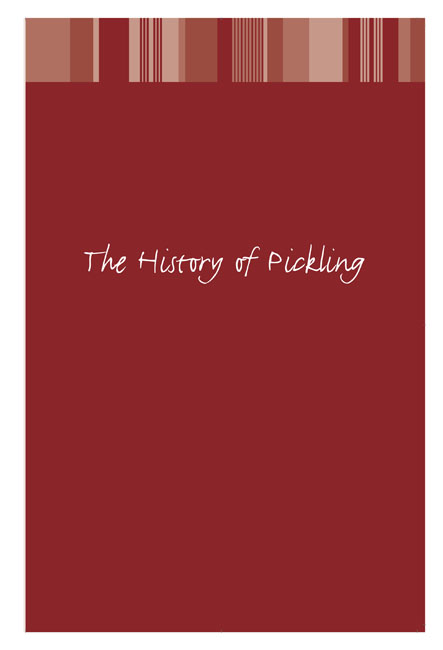
People have been making pickles for more than 2000 years. It is one of the oldest methods of preserving food, although it doesnt have quite the same antiquity as drying, salting and smoking. The earliest hunter-gatherers knew how to preserve their catch of meat and fish by drying it in the open air, and Neolithic man worked out his own ways of curing long before the idea of pickling was discovered.
The Egyptians probably did some pickling; the Greeks certainly did, but it was the Romans who turned it into a fine art. Columella didnt mince words when he wrote vinegar and hard brine are essential for making preserves. Vinegar meant sour wine, and thats exactly what it was made from in Roman times. Yeast, dried figs, salt and honey were added to produce something not only vital for pickling, but also used as a drink diluted with water.
The sheer range of Roman pickles was astonishing. Thanks to their vast empire and conquered territories they had access to almost every fruit, vegetable, spice and herb then known and cultivated: from North Africa and the Middle East came plums, lemons, peaches and apricots; from Europe came cured meats and vegetables; their own gardens produced a whole range of herbs, roots and flowers. There were recipes for pickled onions, plums, lettuce leaves, asparagus, fennel and cabbage stalks. Turnips were preserved in a pickle made from honey, myrtle berries and vinegar: the Roman way was to macerate the ingredients in a mixture of oil, brine and vinegar, which was added carefully drop by drop; then the pickles were stored for months in large cylindrical vases.

